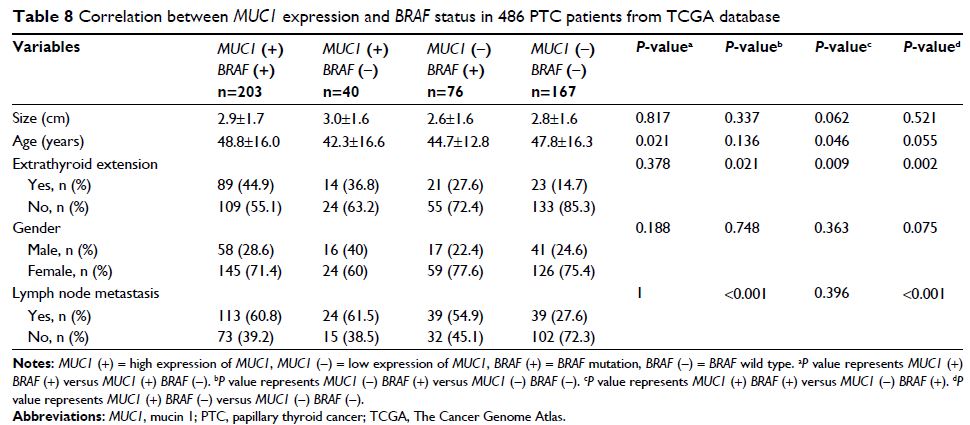108985
论文已发表
注册即可获取德孚的最新动态
IF 收录期刊
- 3.4 Breast Cancer (Dove Med Press)
- 3.2 Clin Epidemiol
- 2.6 Cancer Manag Res
- 2.9 Infect Drug Resist
- 3.7 Clin Interv Aging
- 5.1 Drug Des Dev Ther
- 3.1 Int J Chronic Obstr
- 6.6 Int J Nanomed
- 2.6 Int J Women's Health
- 2.9 Neuropsych Dis Treat
- 2.8 OncoTargets Ther
- 2.0 Patient Prefer Adher
- 2.2 Ther Clin Risk Manag
- 2.5 J Pain Res
- 3.0 Diabet Metab Synd Ob
- 3.2 Psychol Res Behav Ma
- 3.4 Nat Sci Sleep
- 1.8 Pharmgenomics Pers Med
- 2.0 Risk Manag Healthc Policy
- 4.1 J Inflamm Res
- 2.0 Int J Gen Med
- 3.4 J Hepatocell Carcinoma
- 3.0 J Asthma Allergy
- 2.2 Clin Cosmet Investig Dermatol
- 2.4 J Multidiscip Healthc

MUC1 的临床效应及其与甲状腺乳头状癌 BRAF V600E 突变的关系:一项病例对照研究
Authors Li Q, Jin W, Jin Y, Zheng Z, Zhou X, Wang Q, Ye D, Sun Y, Zhang X, Wang O, Chen E, Cai Y
Received 4 January 2018
Accepted for publication 14 March 2018
Published 29 May 2018 Volume 2018:10 Pages 1351—1358
DOI https://doi.org/10.2147/CMAR.S161501
Checked for plagiarism Yes
Review by Single-blind
Peer reviewers approved by Dr Justinn Cochran
Peer reviewer comments 2
Editor who approved publication: Professor Nakshatri
Aim: To investigate the clinical effects of MUC1 on papillary thyroid
cancer (PTC) and explore the relationship between MUC1 expression and BRAF mutation.
Methods: The data of 69 patients subjected to fine-needle aspiration biopsy
in our hospital and 486 patient data downloaded from The Cancer Genome Atlas
(TCGA) database were used. Univariate and multivariate analyses were performed.
Results: The results on the 486 patients recorded in the TCGA indicated
that high MUC1 expression was
independently related to BRAF mutation,
lymph node metastasis (LNM), and unifocal type. In the 69 fine-needle
aspiration biopsy patients with PTC, high MUC1 expression
was significantly related to LNM and extrathyroid extension (ETE). The result of
Pearson’s correlation coefficient showed that BRAF mutation
and MUC1 expression were
moderately correlated. Moreover, in the subgroup with low MUC1 expression, the patients
with BRAF mutation had higher ETE
frequency and LNM than those without BRAF mutation.
In the subgroup with BRAF mutation,
patients with high MUC1 expression
exhibited higher ETE frequency than those with low MUC1 expression, and
high MUC1 expression occurred in
older patients. In the subgroup with BRAF wild-type
mutation, patients with high MUC1 expression had
a higher incidence of ETE and LNM than those with low expression.
Conclusion: We demonstrated that the MUC1 is an
important oncogene in PTC and may have great significance on therapeutic cancer
vaccine development.
Keywords: MUC1 , BRAF mutation, papillary
thyroid cancer, prognosis, lymph node metastasis, extrathyroid extension
